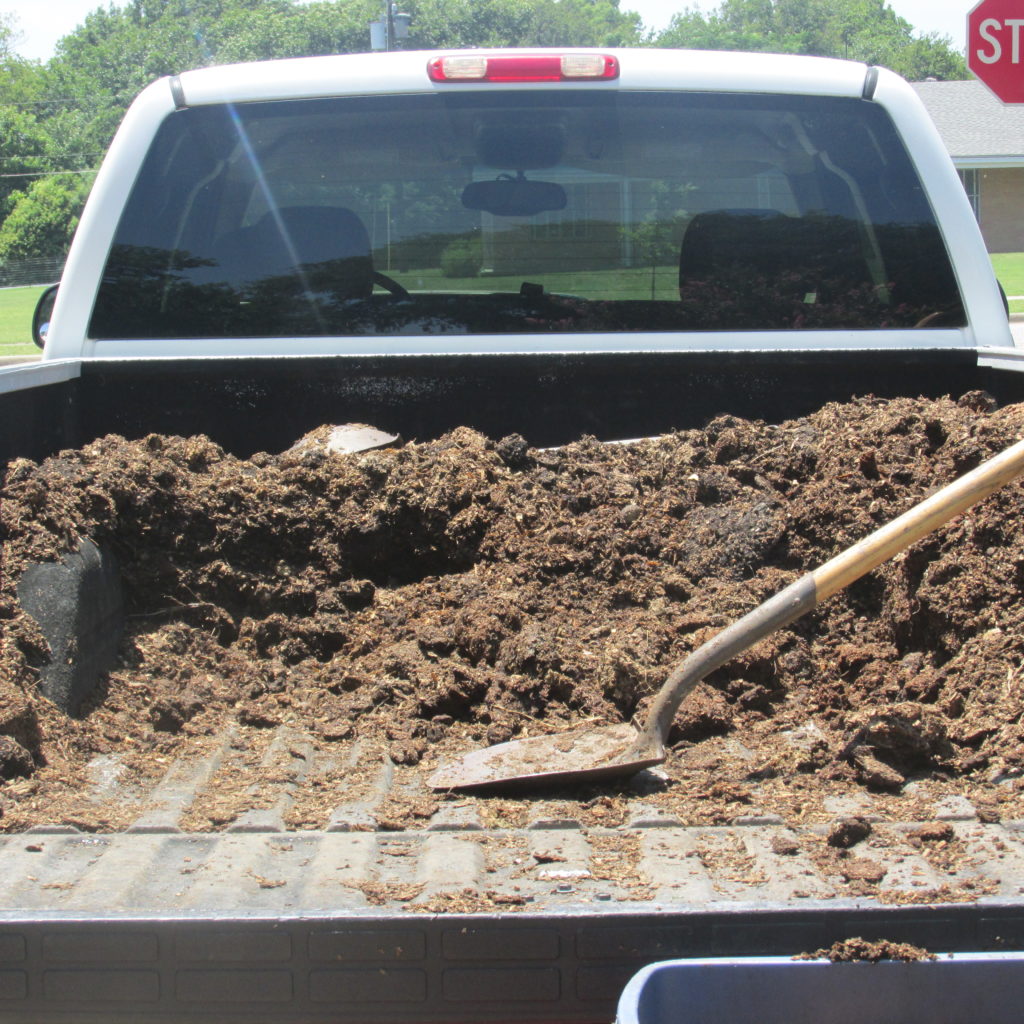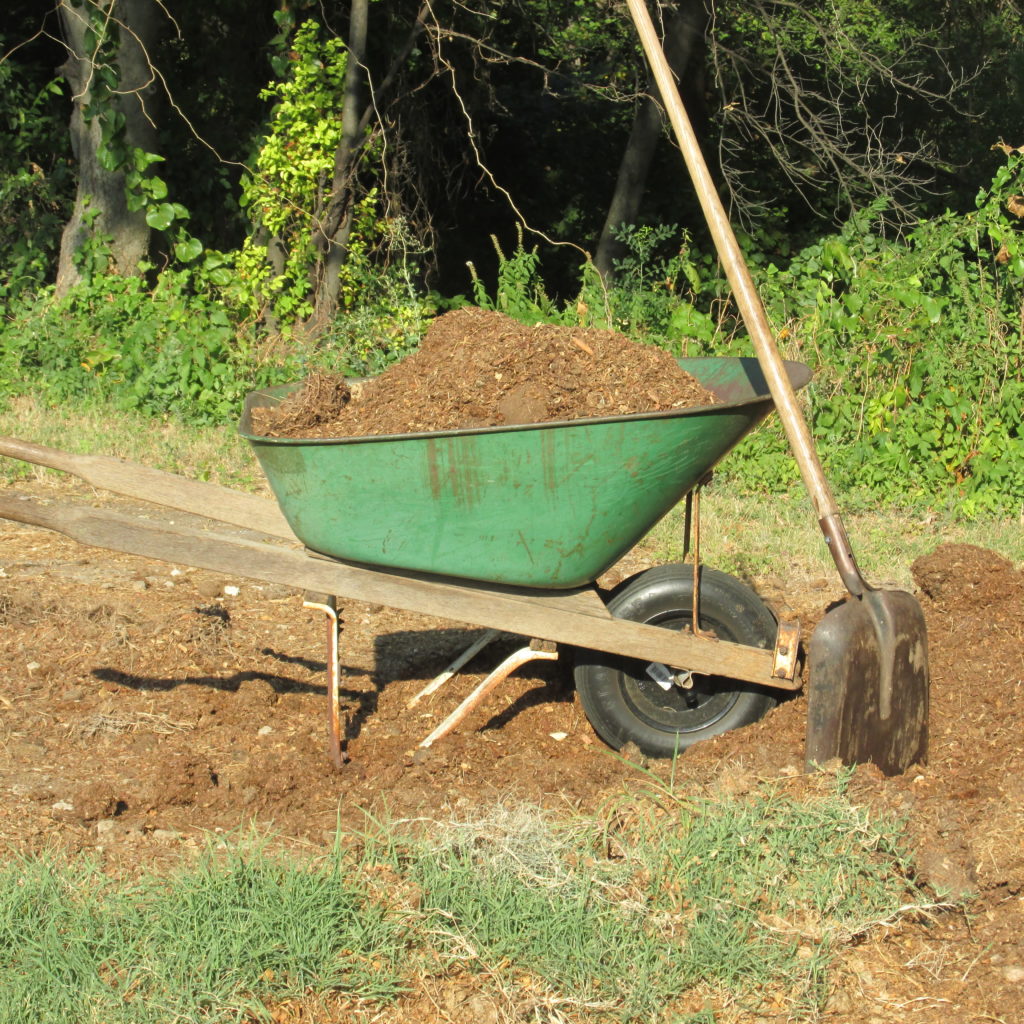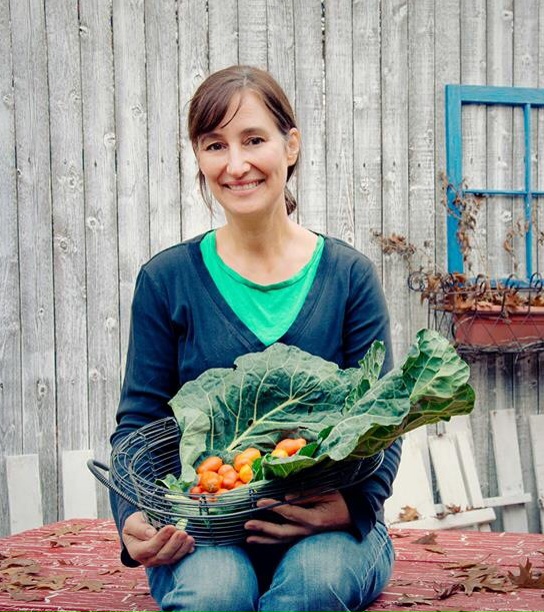Killer Compost:
Why I am Saying Goodbye to Composted Manure
By Anne-Marie Miller
 About twice a year I make a trip to my favorite horse barn to pick up a load of well-composted horse manure for my garden. When I say “pick up” that makes it sound so easy. In reality, what I do is bribe one of my strong boys with a pint of their favorite ice cream to join me. My boy stands on one side of the pickup bed knee-deep in manure and I stand on the other. We both shovel, lifting shovelful after shovelful up and over the bed of the pickup until our arms ache. I always try to outlast my boy, but never can.
About twice a year I make a trip to my favorite horse barn to pick up a load of well-composted horse manure for my garden. When I say “pick up” that makes it sound so easy. In reality, what I do is bribe one of my strong boys with a pint of their favorite ice cream to join me. My boy stands on one side of the pickup bed knee-deep in manure and I stand on the other. We both shovel, lifting shovelful after shovelful up and over the bed of the pickup until our arms ache. I always try to outlast my boy, but never can.
I have always been so thankful for composted horse manure as a valuable nutrient source for my garden. Sadly, times have changed and herbicides have changed. Now, I feel like I am playing a game of Russian roulette with my front yard garden and it makes me furious!
As hard as it is to believe, several herbicides currently made can travel through the intestines of the herbivore and come out on the other side still able to kill broadleaf plants. Even after composting, this chemical can last in the soil for years. For a gardener that means death to the food that they are trying to grow for their family. Once you have this herbicide-laden compost in your beds it is a long, expensive, labor-intensive path to getting rid of it. The active ingredients of greatest concern are picloram, clopyralid, and aminopyralid, which are sold under several brand names such as Grazon. (See brand names below).
Although there is no scientific evidence yet, I can’t help but wonder how this strong herbicide affects the gut health of these animals that consume it in the hay that they eat. Every time a horse dies from colic or a rabbit mysteriously passes, I can’t help but wonder. For those of us that use this “killer compost” in our home gardens the proof is clear to see. Twisted and stunted plants are the product of using this resistant herbicide-laden compost. It happened to Joe Lamp’l of the popular PBS show Growing a Greener World and it can happen to you or I (See article linked below).
 What is an urban gardener to do? I am lucky enough to live in an area that allows me to keep chickens. A lot of the surrounding communities are not so lucky. If you have chickens, using the deep litter method along with added shredded leaves makes a great nutrient-rich compost. Rabbits are another valuable source of manure. However, if you raise rabbits, you will know that they consume hay to keep their digestive tracts moving.
What is an urban gardener to do? I am lucky enough to live in an area that allows me to keep chickens. A lot of the surrounding communities are not so lucky. If you have chickens, using the deep litter method along with added shredded leaves makes a great nutrient-rich compost. Rabbits are another valuable source of manure. However, if you raise rabbits, you will know that they consume hay to keep their digestive tracts moving.
You must find out what that hay was treated with before you can use their manure in your garden. Although I don’t have a leg to stand on when I am scooping up free manure, I do have a stake to find out if the hay I am spending my money on is sprayed with these chemicals. After all, I can take my money elsewhere. The way I went about my investigation was to print out several articles explaining the effects of “killer compost.” I then took them in to my local feed store and gave them a few days to look them over. I contacted the manager a few days later to ask her if she could work with me in making sure the hay I purchased from their store was free of these chemicals. I may or may not have mentioned the fact that I write for a very popular gardening website and had many people that were interested in the outcome. Never hurts to have friends in high places, right?
There is one group of people that this affects the most: gardeners that don’t have any animals on their property to help heat up their compost. I would tell these people that shredded leaves in fall are going to be your most valuable source of compost. You can gather them from the curb all bagged up and ready to go. Spread them out on your lawn and run them over with your lawn mower a few times to shred them before using in the garden. Coffee grounds from your local coffee shop are a great addition. Hey, there are certain advantages to living in the city! Grass clippings in spring (from a herbicide-free lawn) are another great way to heat up that compost pile.
I, myself, am known to be a bit stubborn, so I don’t think I am willing to give up my composted manure source. Truth is, this horse ranch owner and I have become good friends. I have come to enjoy her wisdom and she has come to enjoy my youthful exuberance. I am not exceptionally youthful, so that kind of hints at how old she is. We have been known to sit on the porch swing with watermelon dripping down our chins and swap stories. Boy, she has some good ones! Yeah, I am not willing to give this up.
Thankfully, there is one thing I can do. It is a bean test. When I bring home a load of composted manure I can unload it off to the side until I can make sure that it is safe. By putting it in a tray and planting beans in it I can ensure that it is safe for my garden. If those beans come up strong and green, then I know I am good to go. If they come up twisted and yellow, well then, I know I have to get rid of the stuff. A lot of trouble I know, but better safe than sorry!
Not much in life makes me truly mad, with the exception of this issue. When I think of an herbicide that can pass through an animal, compost for several months and then be lethal for me to grow food for my family in, I think that is just wrong on so many levels. Just the thought of this makes me want to jump up and down, turn red, cuss and spit fire. I know, weird things make me angry, but I am wagering that I am not the only gardener out there that feels this way. How about you?
How do you feel about this issue? Anyone out there had personal experience with “killer compost” in your garden?
 Anne-Marie or Dash (for the hyphen in her name) is an urban farmer in Dallas, Texas. She raises chickens and rabbits on less than ¼ of an acre. Plus, she has turned her front yard into a large stand-out-in-the neighborhood vegetable garden. In addition to the farming she does on her homestead, she helped create a community garden literally from grassy field to thriving garden. What stands out about her little urban homestead is her determined out of the box approach to overcoming obstacles. You can follow her adventures on her little urban homestead by visiting her blog, BloomWhereYourPlanted.com.
Anne-Marie or Dash (for the hyphen in her name) is an urban farmer in Dallas, Texas. She raises chickens and rabbits on less than ¼ of an acre. Plus, she has turned her front yard into a large stand-out-in-the neighborhood vegetable garden. In addition to the farming she does on her homestead, she helped create a community garden literally from grassy field to thriving garden. What stands out about her little urban homestead is her determined out of the box approach to overcoming obstacles. You can follow her adventures on her little urban homestead by visiting her blog, BloomWhereYourPlanted.com.
Further reading:
- See the experience that Joe Lamp’l had with “killer compost”
- Another story of “killer compost” July 2016
- Persistent Herbicide Trade Names (CompostingCouncil.org, 2016):
- Clopyralid: Cloypry AG, Confront, Lontrel, Mellenium Ultra, Reclaim, Stinger, Transline
- Aminopyralid: Chaparral, CleanWave, ForeFront, GrazonNext, Opensight, Milestone
- Aminocyclopyrachlor: Imprelis, Perspective, Plainview, Streamline, Viewpoint
- Picloram: Tordon, Grazon
*Disclosure:
Some of the links in our podcast show notes and blog posts are affiliate links and if you go through them to make a purchase, we will earn a nominal commission at no cost to you. We offer links to items recommended by our podcast guests and guest writers as a service to our audience and these items are not selected because of the commission we receive from your purchases. We know the decision is yours, and whether you decide to buy something is completely up to you.







Great article. This is something all food producers need to know.
Also be aware of de-wormer given to livestock which may pass through their manure and chemicals sprayed on the wheat straw used to make straw bales.
Food waste and spent grain can be safer substitutes for manure.
Beware of coffee grounds. Coffee beans are heavily sprayed with chemicals, with the hopeful exception of organic coffee.
Thank you for pointing that out Barb. I didn’t know that.
Dash
I think you need to do a little more research on your subject. Not all hay that horses eat comes from fields that have pesticides on them. As horse people we buy from farmers that sell hay that don’t treat their fields. What you need to find is someone who deals with a good hay farmer.
Second, my husband has been a food safety director for 40 years. The restaurant chains he worked for would not buy from growers using chicken manure. Chickens (which I own and love) are the one bird that almost always carries Salmonella and using their manure it can be drawn up into to you vegetables especially ones that have high water content. We always use either horse or sheep manure.
Hi Barbara, Yes I know that not all hay produced to feed horses is sprayed with resistant herbicides. It is best to know your hay supplier if you can. I have found it challenging getting horse barns to research into what hay is sprayed with because after all I am not a paying customer and there is no evidence to date that this harms the horses. They are trying to run a business and make a profit of course, I get that.
Very interesting about chicken manure and salmonella. Can you ask your husband if composting the manure would make a difference with that? Also would a home flock have less risk of this than a factory farm situation?
Thank you for taking the time to comment. Input from others is always helpful to see the whole picture.
Dash
I used to have a source for safe horse bedding but I no longer do. I have been having tree trimming companies drop of loads of wood chips. This takes much much longer to break down but it does break down into rich soil. We do what we must to have our gardens thriving right?
Am I the only one who wonders if this isn’t some mean conspiracy to inhibit natural agriculture? I can imagine the Monsanto product managers creating some “all natural” garden enhancer made from petroleum. Man, this frustrates me!
Great article, and good comments. Thank you all for the education on this. Dash – love the “bean test” idea. I’m going to try to remember to do this with the composted manure I buy from the big box stores.
Hello,
Yes, to be on the safe side, you must do the “bean test” every time, unless your manure source gets his hay solely from a trusted source.
I had a bad load from a new source last spring– I would not buy or recommend his products because of the chemicals he had fed to his animals…and his non- disclosure to me.
We just have to be vigilant and work towards better education and creating demand for better products.
Good luck and may your bean seeds always grow healthy!
Hi Dash,
I live in a mid atlantic city. I have been organic gardening for several years. A 35′ organic bed for food and about 90′ for flowers. We collect about 3o bags of oak leaves from our neighbor, which mulches down over winter to about 1 full bag! Certainly not enough for what I need. I have been getting manure from our local riding stable, never thought to ask about the hay or feed, but have not have trouble with wilted plants. Appreciate the Bean check on manure. Do you suggest we use that on bought organic cow manure as well?
Do you have a list of clean name brands of food for horses? I would like to check with the stable on both their hay and their feed. We ride there so it may not be a problem to find out.
I recently had a 150 yr old tulip poplar tree cut down 🙂 and the two loads of chips dumped in my yard. I will be getting timothy hay bales to incorporate into the chips. I hadn’t thought to ask about this hay.
Chickens are my next project. We can have 4. Many years ago (like 50!) we raised meal worms for our reptile pets. I love chickens!
BTW, My daughter lives near you and over the past 5 years has learned Permaculture, volunteering with a group to go to farms to start/help the farmers get into it She has had chickens, and 5 raised organic beds as well.
I am so grateful for your posts. You answer so many of my questions and bring up other questions that I need to look into. THANK YOU for what you do. Blessings, Rev LizAnn
Wow. Thanks for this. This had not even occurred to me. Certainly makes me rethink my processes.
Yes, I had this happen to me. I was always so careful to ensure that the manure I got came from horses that were fed organic feed. But I got greedy and wanted more horse manure and didn’t do a thorough check and ended up with a herbicide contamination that killed everything. It was heartbreaking. From my experience this article describes the situation exactly how I experienced it. Thanks for informing people.
I chose to stop taking free cow manure because I learned they feed the cattle round up corn.
I agree that it’s a bummer that we need to monitor out compost supply these days.